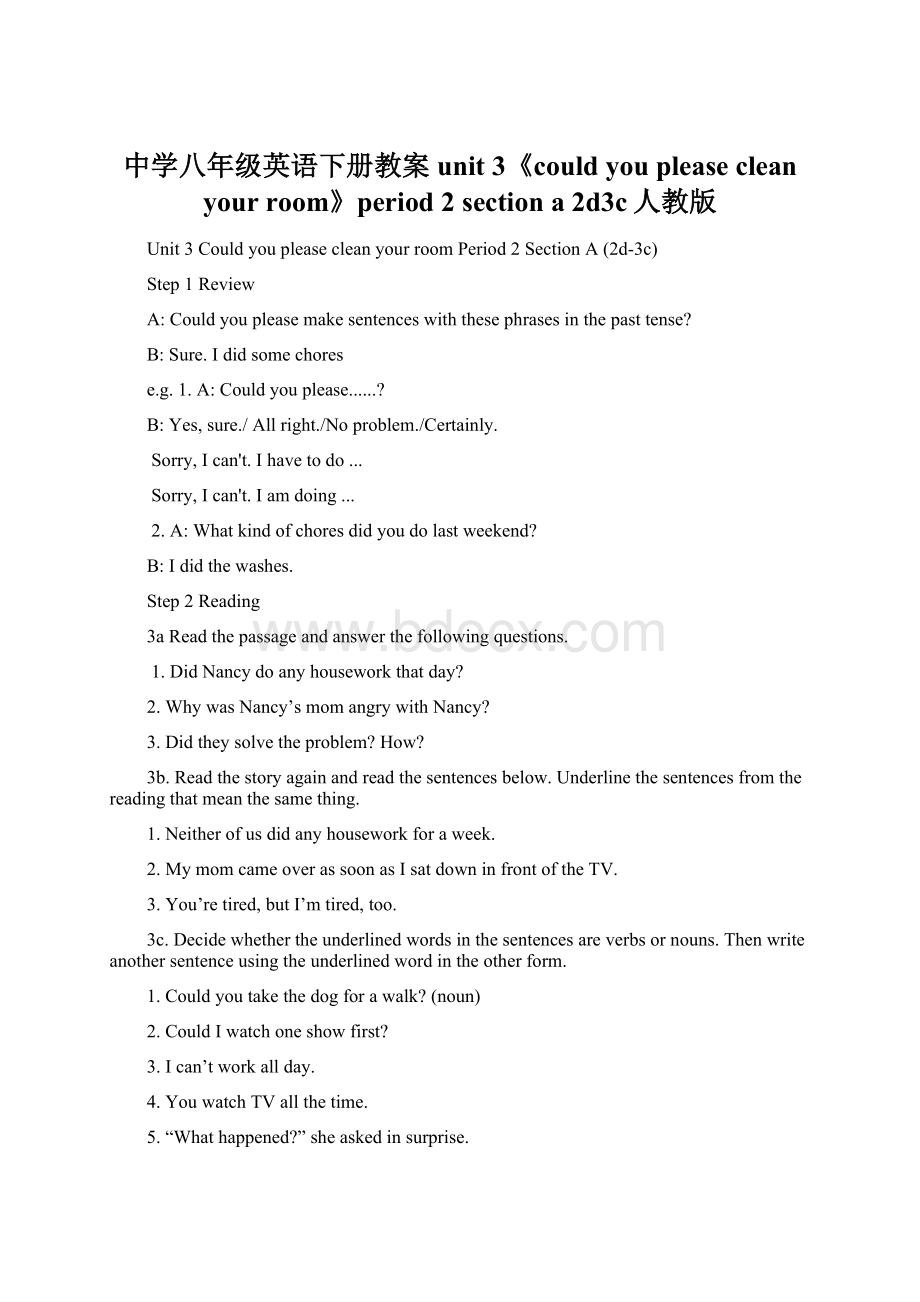中学八年级英语下册教案unit 3《could you please clean your room》period 2 section a 2d3c人教版.docx
《中学八年级英语下册教案unit 3《could you please clean your room》period 2 section a 2d3c人教版.docx》由会员分享,可在线阅读,更多相关《中学八年级英语下册教案unit 3《could you please clean your room》period 2 section a 2d3c人教版.docx(39页珍藏版)》请在冰豆网上搜索。

中学八年级英语下册教案unit3《couldyoupleasecleanyourroom》period2sectiona2d3c人教版
Unit3CouldyoupleasecleanyourroomPeriod2SectionA(2d-3c)
Step1Review
A:
Couldyoupleasemakesentenceswiththesephrasesinthepasttense?
B:
Sure.Ididsomechores
e.g.1.A:
Couldyouplease......?
B:
Yes,sure./Allright./Noproblem./Certainly.
Sorry,Ican't.Ihavetodo...
Sorry,Ican't.Iamdoing...
2.A:
Whatkindofchoresdidyoudolastweekend?
B:
Ididthewashes.
Step2Reading
3aReadthepassageandanswerthefollowingquestions.
1.DidNancydoanyhouseworkthatday?
2.WhywasNancy’smomangrywithNancy?
3.Didtheysolvetheproblem?
How?
3b.Readthestoryagainandreadthesentencesbelow.Underlinethesentencesfromthereadingthatmeanthesamething.
1.Neitherofusdidanyhouseworkforaweek.
2.MymomcameoverassoonasIsatdowninfrontoftheTV.
3.You’retired,butI’mtired,too.
3c.Decidewhethertheunderlinedwordsinthesentencesareverbsornouns.Thenwriteanothersentenceusingtheunderlinedwordintheotherform.
1.Couldyoutakethedogforawalk?
(noun)
2.CouldIwatchoneshowfirst?
3.Ican’tworkallday.
4.YouwatchTVallthetime.
5.“Whathappened?
”sheaskedinsurprise.
2.I’mjustastiredasyouare!
as...as意为“和……一样”,表示同级的比较。
使用时要注意第一个as为副词,第二个as为连词。
其基本结构为:
as+ adj./ adv. +as。
e.g.This film is as interesting as that one.这部电影和那部电影一样有趣。
Your pen writes as smoothly as mine.你的钢笔书写起来和我的一样流畅。
as…as的否定形式为“notas/so+adj./adv.+as”。
e.g.Hedidn’tactaswellasyou.他表现得不如你好。
3.Foroneweek,shedidnotdoanyhousework,andneitherdidI.
neither用作副词,作“也不”解释,放在句首,表示前面否定的内容也适用于另一个人或物,句子须采用部分倒装。
此时也可用nor替换neither使用。
例如:
—I don’t like this dress. 我不喜欢这件连衣裙。
—Neither / Nor do I. 我也不喜欢。
注意:
neither之后的主语要置于助动词或系动词之后。
neither用作代词,表示“两者都不,双方均不”。
例如:
He answered neither of the letters. 他两封信都没回。
—Which one would you like?
你喜欢哪一个?
—Neither.两个都不喜欢。
also,too,either,neither的用法
一、also是比较正式的用语,语气较庄重。
它通常放在句中,位于行为动词之前,连系动词之后;如有助动词或情态动词,一般放在助动词或情态动词之后。
例如:
Peteralsohastwobrothers.彼得也有两个兄弟。
Iamalsoastudent.我也是一名学生。
Mrs.GreencanalsosingthesonginChinese.格林夫人也能用汉语唱这首歌。
二、too是普通用词,多用于口语,语气较随便。
一般用在肯定句中,放在句末。
例如:
I’minRow1,too.我也在第一排。
注意:
also和too一般都用于肯定句,很少用于否定句。
三、either表示“也”时,一般只用于否定句,且置于句末。
例如:
Idon’tknowhim.Tomdoesn’tknowhim,either.
我不认识他,汤姆也不认识他。
Ifyoudon’tgothere,hewon’tgothere,either.
如果你不去那儿,他也不会去那儿。
注意:
either本身没有否定的意义。
所以多与not连用。
四、neither表示“两个都不”,它作主语时,谓语动词常用单数。
例如:
Neitherofyoucandoit.你们两个都不能做这件事。
Step4Summary
1.Newvocabulary
lastmonth,comeover
takethedogforawalk,watchoneshow
allthetime,thenextday,neitherdidI
2.TheminuteIsatdowninfrontoftheTV,mymomcameover.
Foroneweek,shedidnotdoanyhousework,andneitherdidI.
I’mjustastiredasyouare!
Step5Homework
1.Listallthemainphrasesofdoingchoresthatyouknow.
2.Makeaconversationbetweenyouandyourmother,usingthesentencepattern“Couldyouplease…?
CouldI…?
”
课后记:
Unit3CouldyoupleasecleanyourroomPeriod4SectionB
Step1Review
单项选择。
1.--Couldyoupleasetakecareofmydog?
--______.I’mtoobusy.
A.Yes,youcan
B.Sure
C.Sorry,Ican’t
2.--Couldyouplease____hisbed?
--Certainly!
A.makesB.makingC.make
3.--CouldIuseyourcar?
--______.
A.Sure,youcan
B.Sorry,youcan
C.Sure,Ican
4.Couldyouhelp_____?
A.makingthebed
B.makethebed
C.madethebed
Step2Discussion
Q1:
Doyouhelpyourparentsdothechoresathome?
Q2:
Doyouaskyourparents’permissionfor?
Q3:
Doyourparentsaskyoutodosomethingsforthem?
Givesomepicturesandanswerthefollowingquestions.
Whatdoyourparentsaskyoutodo?
Whatdoyouaskyourparents’permissionfor?
Step3
Finish1a.Whatdoteenagersasktheirparents’permissionfor?
Whatdoparentsasktheirteenagerstodo?
Writeparentsorteenagersnexttoeachphrase.
1.buysomedrinksandsnacks
2.borrowsomemoney
3.cleanyourroom
4.invitemyfriendstoaparty
5.gotothestore
6.useyourCDplayer
7.takeouttherubbish
8.makeyourbed
Step4.
Finish1b.Usethephrasesin1atomakeconversations.
Step5Pairwork
1.Parents:
Couldyouplease…?
Child:
Yes,sure./Sorry,Ican’t.Ihaveto...
2.Child:
CouldI…?
Parents:
Yes,youcan./No,youcan’t.You...
Step6Listening
Finish1c.ListentoaconversationbetweenSandyandhermom.Check(√)thethingsin1athatyouhear.
1.buysomedrinksandsnacks
2.borrowsomemoney
3.cleanyourroom
4.invitemyfriendstoaparty
5.gotothestore
6.useyourCDplayer
7.takeouttherubbish
8.makeyourbed
Finish1d.Listenagain.Fillinthechart.
Whataretheygoingtodo?
Sandy’smom
Sandy
inviteherfriends
SandyandDave
Step7Finish1e.
Youarehavingaparty.Inviteyourpartnertocomeyourpartyandaskforhelpwith
thesethings.So,talkaboutthefollowingthingswithyourpartner.
e.g.A:
Wouldliketocometomybirthdayparty?
B:
Yes,I’dloveto./Sorry,Ican’t.Ihaveto…
A:
Couldyoupleasetakeouttherubbish?
B:
Yes,sure./No,Ican’t.Ihavetodo…
Step8Reading
1.Warmingup
2a.Discussthequestionswithyourpartner
1)Whatdoyouoftendotohelpyourparentsathome?
2)Doyouthinkkidsshouldhelpoutwithchoresathome?
2.Newwords
stressn.精神压力;心理负担
wasten.浪费;垃圾v.浪费;滥用
dependv.依靠;依赖
developv.发展;壮大
fairnessn.公正性;合理性
sinceconj.因为;既然
prep.,conj.&adv.从……以后;自……以来
neighbor(=neighbour)n.邻居
dropv.落下;掉下
了解阅读策略:
Skimming意为“快速掠过,从中提取最容易取得的精华”。
这种读法包含有原词的所有意思——快速读过去,取出读物中关键性的东西。
因此,我们可以把这种读法理解为快速浏览课文,领会文章大意。
一般而言,通过标题可知道文章的主题。
对文章的首段和末段要多加注意,以便发现作者的观点。
Answerthequestions.
1)WhatisMs.Miller’sopinion?
2)WhatisMr.Smith’sopinion?
4.Reading
2c.AccordingtoMr.SmithandMs.Miller,whataretheprosandconsaboutkids
doingchores
Readthelettersagainandfinishthefollowingtasks.
I.完成句子,每空词数不限。
1.Ms.Millerthinkschildrenshouldspendtheirtimeonschoolworkinorderto_____________________________________________.
2.Mr.Smiththinksthesedayschildrendependon_______________________.
II.判断正(T)误(F)。
()3.Ms.Millerthinksdoingchoresisnotdifficult.
()4.Mr.Smith’sneighbors’sonlookedafterhimselfwellduringhisfirst
yearinthecollege.
2d.Writeonesentencewitheachphrasefromtheletters.
Discussthequestionswithpartner.
Step9Languagepoints
1.Itistheparents’jobtoprovideacleanandcomfortableenvironmentathomefortheirchildren.
此处代词it仅为形式上的主语,真正的主语是toprovide…fortheirchildren。
我们也可将Itisone’sjob(duty,…)todosomething.视为一个固定的句型,表示“做某事是某人的工作(职责等)”。
如:
It’severyteacher’sjobtoexplainthingsclearlytothestudents.
把东西给学生讲明白是每一位老师应做的事情。
provide作动词,意为“提供;供应”。
providesb.withsth.或providesth.for
sb.意为“为某人提供某物”。
如:
Themovietheaterprovidesuswithgoodservice.
Hisschoolprovidedahouseforhim.
汉译英。
他们提供给他钱和衣服。
Theyprovidedhimwithmoneyandclothes.
Theyprovidedmoneyandclothesforhim.
2.Andanyway,Ithinkdoingchoresisnotsodifficult.
反正我觉得干点家务也不难。
anyway是一个副词,若位于句首,其后往往会有逗号将其与句子的其他内容隔xx。
anyway在此句中的作用是追加评论,相当于汉语的“反正;仍然;依然”。
如:
Samdidn’tgetthejob,buthe’snotunhappybecauseitdidn’tpaywellanyway.
萨姆没有得到那份工作,但他并没有闷闷不乐,反正薪酬也不算高。
anyway还可用来表示“不管怎样;无论如何”之意。
例如:
It’sjustacold.Butanyway,youshouldstillseethedoctor.
这只不过是感冒,但不管怎样,你还是应该看看医生。
3.ill&sick
◆相同点
ill与sick都可以表示“生病的”,都可作表语。
如:
Alicewasill/sickyesterday.
◆不同点
表示“生病”时,sick可作定语,但ill通常不作定语。
如:
Couldyouhelpthesickgirl?
【运用】根据句意,用ill或sick填空。
(1)Thedriversentthe________babytothehospital.
(2)Mybrotheris________.Ihavetolookafterhimathome.
4.Theearlierkidslearntobeindependent,thebetteritisfortheirfuture.
孩子们越早学会独立,对他们的未来就越好。
“the+比较级+……,the+比较级+……”是英语中一个常用的句型结构,表示“越……,就越……”。
如:
Themoreheexplained,thebetterweunderstood.
他解释得越多,我们就理解得越透彻。
Manypeoplebelievethatthemoreapersonreads,thewiserhewillbecome.
很多人相信一个人书读得越多就会变得越聪明。
Step10Exercise
I.根据句意及所给首字母提示,补全句中所缺单词。
1.Hewasi_____butnobodytookhimtothehospital.
2.Ifyoudon’tstudyhard,yourgradeswilld______.
3.IlikeOldHenrybecauseheoftenp_______uswithhotwater.
4.Wecand______onhimforhelp.
5.Motherthinksplayingcomputergamesisaw______oftime.
II.根据句意,用括号内所给单词的适当形式填空。
1.He_________(develop)afarmfromnothing.
2.Infact,youngpeoplehavetoomuch______(stress)today.
3.Hedidn’tmind________(help)mewithmyEnglish.
4.Mr.LiandMr.Wangarebothmy_________(neighbor).
5.Whydidthemanmakethelittleboy________(carry)water?
Step11Homework
Afterclass,pleasemakesomenewdialogueswiththephrasesin1a.
课后记:
Unit3CouldyoupleasecleanyourroomPeriod5SectionB
Step1Revision
Discussthequestionswithapartner.Andtakenotes.
Doyouthinkchildrenshoulddosomechoresathome?
Whyorwhynot?
Childrenshoulddochores
because…
Childrenshouldnotdochores
because…
Step2Howtowritealetter
1.信头:
发信人地址和日期。
这部分中有时可省去发信人地址,但一般要写日期。
放在信纸的右上方。
2.称呼:
对收信人的尊称。
最普通的是Dear,但与Mr,Mrs,Miss等不同的是:
Dear后一般用名字,而Mr,Mrs,Miss后不能单独用名字,而只能是姓或姓与名,比如:
对JohnSmith的称呼,应该是MrSmith,MrJohnSmith或DearJohn.称呼后面可用逗号或者冒号。
3.信的正文。
4.结尾:
发信人对收信人的谦称或敬语。
放在信的右下方。
这部分要特别注意英语习惯,不可根据汉语意思写上诸如“此致敬礼”、“祝您健康”之类的中国式的结尾语。
常用的英语书信结尾语如下:
写给同龄人或年长的朋友:
Yours sincerely,Sincerelyyours,Yours等等。
写给好朋友:
Love,Withlove,Bestwishes等等。
写给亲戚:
Love,Withlove,Affectionatelyyours,Your(ever)lovingson(sister等等)。
5.签名。
签名一般在结尾语的下面一行。
一般在表示道歉没有及时给对方写信时,还要简述原因或写上安慰的话。
遗憾:
Iwassorryt